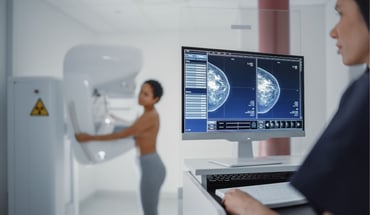
With all of the colon prep involved, it can be easy for most people to avoid their colonoscopy, but there is a different way of screening you may be eligible for.
Colonoscopies continue to remain the standard for detecting colon and rectal cancer. However, people considered at average risk of colorectal cancer may prefer an alternative: at-home colon cancer screening.
At-home colon cancer tests can be more convenient than a colonoscopy procedure. Take a look at how they’re used.
1. There are Several Types of At-Home Colon Cancer Tests
Fecal occult blood tests, or FOBTs, are a type of screening that checks for the presence of blood in a stool sample. Sending a stool sample to the lab to be tested is required since occult blood isn’t visible to the naked eye. Screening this way can help doctors diagnose both benign (noncancerous) conditions, such as hemorrhoids, and potential colorectal cancer.
The US Food and Drug Administration has approved a few different stool tests that can be used to detect colon cancer. Your doctor should order the test kit for you. Once ordered, the lab company will get in touch with you directly to have the kit sent to you.
It’s important that the instructions are followed carefully to make sure you receive accurate results!
Fecal Immunochemical Test (FIT or iFOBT)
The cost and increased sensitivity in detecting blood in the stool make this test more commonly used. FIT or iFOBT involves the use of antibodies that bind to hemoglobin protein — an indication that blood might be present in the stool. Collecting a sample is pretty straightforward: a fecal sample is scraped with a small probe, inserted into a sampling container, and returned to the lab. While changes in diet are not required before this type of testing, certain medications may affect test results. Prior to taking the test, you should consult with your healthcare provider about what you may need to avoid or modify temporarily.
Guaiac FOBT (gFOBT)
The gFOBT is another test that detects blood in the stool — specifically, heme, a component of hemoglobin. In this test, you’ll collect samples from a few different bowel movements with an applicator and smear the samples onto a paper card coated with guaiac (a substance from a tree that grows in the Caribbean called Guaiacum). Then, the card gets sent off to a lab for testing. At the lab, hydrogen peroxide is added to the card. If the card turns blue, it means blood is present.
Your doctor might ask you to temporarily stop eating foods containing heme in order to avoid a false positive result. You may need to refrain from consuming red meat, poultry, seafood, turnips, horseradish, and citrus fruits and juices. Results can also be skewed by certain nonsteroidal anti-inflammatory drugs (NSAIDs) and supplements, such as Vitamin C and iron. Talk to your doctor about what changes you need to make prior to testing.
Stool DNA Test (FIT-DNA)
This is a combo test used to detect blood in the stool and screen DNA cells that are shed from the colon and rectum during a bowel movement. The Cologuard test is a FIT-DNA test that looks for blood in the stool and specific genetic mutations that could lead to colon or rectal cancer.
Upon receiving the collected sample, the lab can extract DNA from it to identify whether or not mutated or abnormal genes are present. A full stool sample is required for this type of test, and you do not need to alter your diet beforehand. Cologuard is a well-known brand for this type of test.
Whatever test you choose to take, women should not take it while on their period. Doing so can produce a false positive.
2. A Negative At-Home Colorectal Cancer Test Result is a Good Thing
Test results that come back negative for a FIT, iFOBT, or gFOBT test mean the sample did not contain blood. A FIT-DNA test that came back negative didn’t find blood or any genetic mutations associated with colorectal cancer.
Sometimes, a test result might come back inconclusive. This means there could have been an issue with your specimen. When this happens, your primary care physician might request you take the test again.
Your doctor can also explain the risks of a false-positive or false-negative result. Regardless of the risk, the National Cancer Institute highlights the benefits. “Studies show that some screening tests for colorectal cancer help find cancer at an early stage and may decrease the number of deaths from the disease.”
3. Blood in the Stool is Not a Sure Sign of Cancer
If your test returns positive for blood, it’s not time to panic. While blood in the stool can be a sign of cancer, there are other causes for this condition.
Gastrointestinal bleeding can actually be caused by conditions such as irritable bowel disorder, ulcers, hemorrhoids, polyps, and anal fissures.
It’s likely your doctor will recommend a colonoscopy as a next step if blood is found in the test results to rule out cancer and possibly identify the source of the bleeding.
4. Black Stools Can Be Caused By a Serious Condition and Shouldn’t be Tested with an At-Home Screening Kit
Black, tarry bowel movements can result from several factors, including certain foods or medications that can make the stool appear unusually dark. This discoloration will stop once those items are no longer being ingested.
Do not rely on an at-home colorectal cancer screening test if you notice this type of black or tarry stool. It can be a sign of cancer or another serious condition, such as tears in the esophagus, ulcers, or swollen veins. If you notice black stools for more than a couple of days, it’s recommended to contact your primary care doctor to discuss possible causes and tests to examine you further.
5. There Are Some Disadvantages of At-Home Colorectal Cancer Tests
While the pros of at-home colon cancer tests include being convenient and non-invasive, they also have some disadvantages to take note of. At-home testing isn’t as accurate as other screening methods for colorectal cancer. Compared to colonoscopies, they have a higher chance of resulting in a false positive or false negative, meaning you might need follow-up testing. Some people also find that at-home tests are difficult to administer. This, of course, can result in a visit to your doctor for a colonoscopy.
If an at-home test for colon cancer is not an option for you, a few other tests can be used, with a colonoscopy being the most common.
When Does Colorectal Cancer Screening Start?
The American Cancer Society recommends colorectal cancer screening start at age 45 for people with an average risk of colorectal cancer and no symptoms. Individuals with certain pre-existing conditions, such as ulcerative colitis or genetic syndromes, are considered high-risk and may need to be screened earlier or more often. Our blog discusses why colon cancer screening is recommended at age 45 and how this affects you.
If your screening test suggests colon or rectal cancer, additional testing will be needed in order for your doctor to make an official diagnosis.
Regular Colorectal Cancer Screenings Are Proven to Save Lives
The colorectal cancer doctors at Virginia Oncology Associates recommend colon and rectal cancer screening for early detection and prevention starting by age 45. Advances in screening methods as well as changes in lifestyle for younger people, make it especially important that you talk to your primary care doctor by age 40 to discuss the right timing for you and which tests should be used.
Related reading: Colorectal Cancer in Young Adults: What You Need to Know
If abnormal test results determine that colon cancer is present, VOA’s oncology team is here to answer your questions and create a colorectal cancer treatment plan tailored to your specific needs. We also offer second opinions as you start making decisions.



